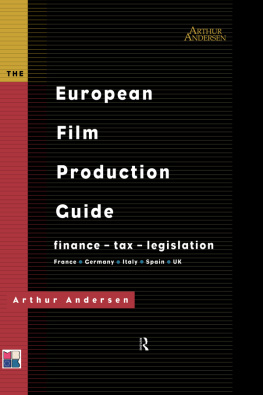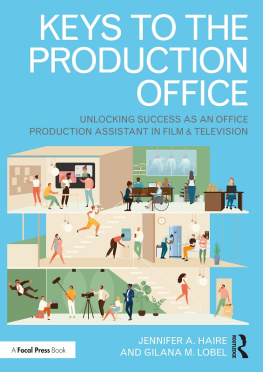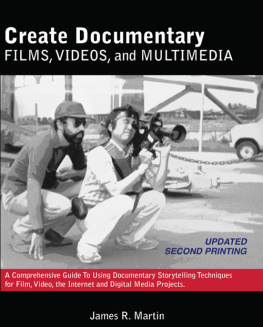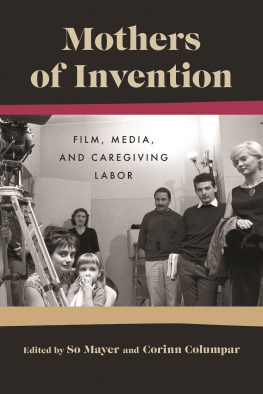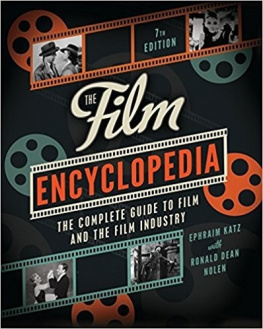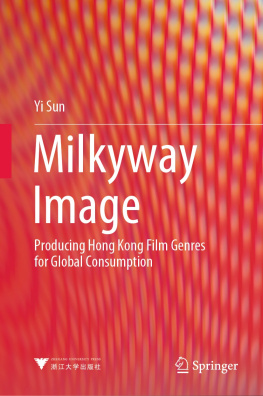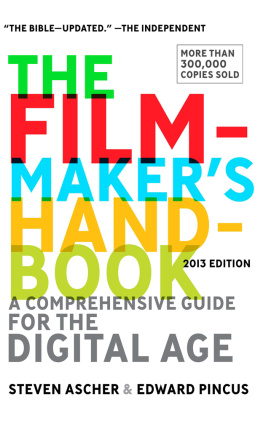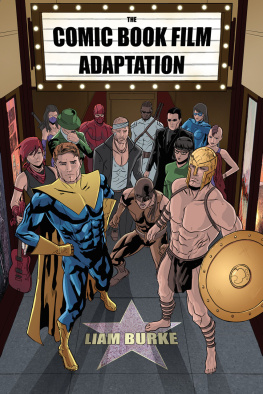Making Film in Egypt
Making Film in Egypt
HOW LABOR, TECHNOLOGY, AND MEDIATION SHAPE THE INDUSTRY
CHIHAB EL KHACHAB
The American University in Cairo Press Cairo New York
This electronic edition published in 2021 by
The American University in Cairo Press
113 Sharia Kasr el Aini, Cairo, Egypt
One Rockefeller Plaza, 10th Floor, New York, NY 10020
www.aucpress.com
Copyright 2021 by Chihab El Khachab
All rights reserved. No part of this publication may be reproduced, stored in a retrieval system, or transmitted in any form or by any means, electronic, mechanical, photocopying, recording, or otherwise, without the prior written permission of the publisher.
ISBN 978 977 416 985 4
eISBN 978 1 649 03043 6
Version 1
Papa, Maman et ZizouContents
Figures
Acknowledgments
M uch like coordinating a shooting day or visualizing a film, writing a book is, at its core, an imponderable quest. The various mediations through which I have worked are not without resemblance to those employed by my interlocutors in the Egyptian film industry: they include a great number of now invisible readings, conversations, observations, and interactions. This book will therefore stand, to the reader, as a reified product of much concrete labor, anticipations, anxieties, funny moments, generous assistance, and innumerable encounters, in Deleuzes sense. I can only begin to uncover all the work invested in this book through this acknowledgments section, and I hope to be forgiven by anyone I omit.
This book would not have been possible without the participation of all the Egyptian filmmakers I met. I went to Egypt with three contacts in hand, each becoming a generous guide into the film industry: Safaa el-Leissi, Jennifer Peterson, and Hala Lotfy. I owe special thanks to Hala and everyone who worked in her production cooperative Hassala: Abdallah el-Ghaly, Abdelrahman Mana Mahmoud, Heba Othman, Chahira Nasef, Nayera El Dahshoury, Mona Lotfy, Wesam Lotfy, and Mohammed Rashad. I owe infinite thanks to the general manager in New Century Film Production, Ahmad Badawy, whose trust and assistance molded the course of my fieldwork. I also wish to thank Ahmed Farghalli and Mohamed Setohy for taking me under their wing in Dcor (2014), and patiently answering my endless queries with a genuine desire to be helpful. I never spent a dull day with them or their production crew, which included Hany Abdel Latif, Ahmad Abdallah Abdel Halim, Mustafa Abu Zeid, Rasha Gawdat, Mahmoud Abdallah, Khaled Labanita, Mohammed Fathallah, Adham el-Sayeh, and Georges Ramsis.
The director Ahmad Abdalla generously allowed me on set in Dcor, and I thank his patience for what he deemed to be my inexplicable presence. The cinematographer Tarek Hefny, the art directors Asem Ali and Nihal Farouk, the stylist Salma Sami, and the sound engineer Ahmad Saleh were also puzzled by my presence on set, but they never hesitated to answer my questions or help with my project. Their assistants were all, without exception, very helpful: I wish to acknowledge the first assistant director Omar el-Zohairy; his script supervisors Jaylan Auf and Mariam el-Bagoury; his second assistant director Renad Tarek; the assistant decorator Mohammed Ezzat; the chief builder Hussein Wezza; the prop assistant Mustafa Seyaha; the second assistant decorator Youssef el-Tarabolsy; the focus puller Moataz Mosallam; the lighting script Hany Morsy; the gaffer Mahmoud Morsi; the best boys light Ibrahim Morsi and al-shabah Ahmed Desha; the best boy grip Ahmad Said; the chief camera technician Hamada; his assistant Mustafa Msallem; the edit-camera Yasser Zanita; the sound assistants Ahmad Abdel Nasser and Ahmad Rashdan; the clapper Abdelsalam Radwan; the video-assist Adil; and the editor Sara Abdalla.
I was also involved in more New Century productions, and I wish to thank the directors Daoud Abdel Sayyed, Tamer Mohsen, and Ismail Farouk for allowing me on the sets of Qudrat ghayr adiya (2015), Qitt wa far (2015), and al-Nabatshi (2014), respectively. I have met many more production crew members on these projects, whose input will be apparent throughout this book: I wish to thank Tamer Fathi, Khaled Adam, Mohammed Sabry, Mohammed Mselhi, Khaled Ahmed, Amr Azkalani, Mohammed Ibrahim, Samir Semsem Nabawy, Mohammed Kassab, and Ahmad Abd El Aal. I would also like to thank the assistant directors Hossam Ali and Mohammed Tahawi, as well as the accountant Mohammed Hosny and the photographer Yasser Shafiey.
My fieldwork took an unexpected turn when Ahmad Fawzi Saleh, now a dear friend and one of the greatest sponsors of this research project, asked me to work with him on Poisonous Roses (2018). This experience has been eye opening on an academic and a personal level, and I have established long-lasting friendships with all those who have contributed to our project and, by extension, my research project. I wish to thank Fawzi, his wife Eman Hemeda, their most adorable son Hassan, Maged Nader, Mostafa Nour, Yousef Abodan, Georges Mokhtar, Ahmad Adil, Bassam Farhat and his assistants Ahmad Rashdan and Mustafa Shebo Shaaban, and the actors Maryhan Magdy, Ibrahim el-Nagary, Rmie Akl, Mohamed Berakaa, as well as the great Mahmoud Hemida. I would also like to thank Osama Abol Ata, Omar Abdel Wahab, Houssam Habib, Lina Aly, and Hady Mahmoud, who provided important input into my project even if they were no longer part of the movie by the time of its postproduction.
This list would be incomplete without all those who generously consented to a formal interview with me: I will thank, in no particular order, Wael Mandour, Marwan Hamed, Wahid Hamed, Tamer el-Said, Marwan el-Kahki, Abdelsalam Moussa, the late Mohammed Khan, Wessam Soliman, Sandy Samuel, Safei Eldin Mahmoud, Hani Adel, Marwan Saber, Mahmoud Lotfy, Onsi Abou Seif, Yousry Nasrallah, Maged Moussa, Karim el-Mihi, David Maher, Daoud Abdel Sayyed, Hisham Saqr, Mona Rabie, Gaby Khoury, Sherif Mandour, Marianne Khoury, Mariam Naoum, Reda Zanita, Mahmoud el-Touny, Mohammed el-Tohami, Moataz el-Kateb, Wael Farag, and Mohammed Samir.
Outside the industry, I am greatly indebted to those who made my stay in Cairo as agreeable as it was fruitful. I wish to thank Montasser el-Kaffash, Shereen Abouelnaga, Alice Hackman, Habi Seoud, Walid Abu Seoud, Hesham Aslan, Heba el-Karrar, Swagat Pani, and my childhood nanny Madeleine. I would also like to thank my mothers and my fathers family in Cairo, in particular Khalo Yasser, who has been very enthusiastic about my academic vocation; the late Khalo Khaled and his wife Nisreen, whose insistent invitations have been a great occasion to relax with their kids Karim, Selim, Fahd, Taim, and Shagy; Alaa el-Karrar, Wael el-Karrar, their wives Azza and Ola, and their kids Mohammed, Mariam, Ali, Nadine, and Omar, without whom I would have spent many lonely holidays; and above all my grandmother Touta, whom I visited with great pleasure, if only to marvel at her unrelenting desire to go on against all odds.
I have yet to mention the personal and intellectual debts that I accumulated while planning and writing this book. Fieldwork for the book was completed thanks to a generous Social Sciences and Humanities Research Council of Canada doctoral dissertation award as well as a School of Anthropology and Museum Ethnography doctoral award from the University of Oxford. I wrote the manuscript while a Junior Research Fellow at Christ Church, University of Oxford. Before I started working at Oxford, I had the privilege of studying with scholars who have had a lasting impact on me. At the University of Ottawa, I would like to thank Natacha Gagn, Julie Laplante, and Stphanie Gaudet. At the Universit de Provence (Aix-Marseille I), I would like to thank the late Bruno Martinelli and Pierre Lemonnier for introducing me to the French school in the anthropology of technology. At the University of Washington, I would like to thank Sareeta Amrute and Carolyn Pinedo Turnovsky. Lastly, at McGill, I would like to thank Will Straw and Axel van den Berg, who have been incredible and rigorous intellectual mentors.


